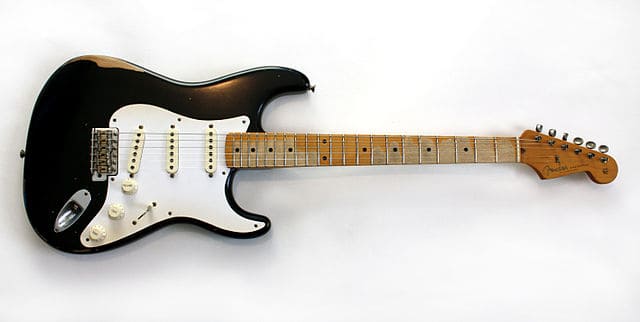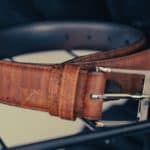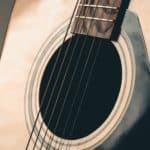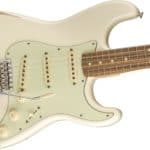Guitars get beaten up with time.
It’s inevitable.
Playing them is physical work and years of it eventually take their toll.
To some of us, the look of a worn-out instrument can be quite appealing, but are there any downsides to it?
Does fretboard wear affect the tone and playability of a guitar?
Although fretboard wear is unlikely to affect the tone of your instrument, the deeper the divots are, the more likely to influence playability in a negative way as strings might start to get stuck in the ridges and difficult generating smooth bends and vibrato. Also, intonation problems might arise.
In this article, I will tell you all you need to know about how common usage marks on your fretboard could affect your tone and the way your instrument plays.
After leaving this page you will have a clearer idea about how much you should worry about this, and if it’s worth it to try to prevent it.
Are you ready to get started?
Let’s go!
What is fretboard wear actually?
When you press down on a guitar fret, the string will end up resting on the fretboard. It’s natural and how guitars are designed to work.
Now, think of fretting a note and bending it, or doing some vibrato on it. Now you can start picturing how this grinding against the wood can start wearing it off.
The harder you press, the more erosion you will be generating with time.
Also, some fretboard tonewoods could be more prone to damage, however, I’ve seen fingerboards of all flavors get battered with time.
Fretboard wear, again, is something that just happens, and the more you use a guitar, the faster you will start noticing it.
Can fretboard wear affect the tone of a guitar?
I don’t think it can be proven that a worn-out fretboard could really influence the tonal quality of a guitar.
However, I can see how deep ridges in the fretboard could lend for the strings to sink deeper when fretted, and if pressed too hard, generate some intonation issues.
This is nothing that happens only on worn-down fingerboards, but perhaps an issue that could be augmented by them.
Other than this, I think most of the downsides for a heavy relic’d guitar fretboard come in terms of playability.
Can fretboard wear have an impact on the playability of a guitar?
Mint condition fretboards, at least on higher-end instruments, are designed and set up in a way that provides the smoothest experience possible to the player, allowing for gliding across them without too much friction.
At least that’s how things should work in a perfect world.
As fingerboards wear down, they start getting rougher to the touch, and even some ridges could develop where strings start to get stuck.
This is clearly a drawback for smooth bends and soft vibratos since you could end up having to fight the string’s tendency to descend into these cavities at a certain point of the vertical travel.
Apart from this, and as I mentioned earlier, a heavily worn-out fretboard could end up making you feel that the frets are deeper and leading you to press down harder than you should when fretting notes, thus making them go slightly sharp.
Is fretboard wear on a guitar repairable?
Wear divots on a guitar’s fingerboard are indeed repairable.
Guitar techs usually fill them with special compounds, a mix of glue and sawdust, or with small pieces of wood.
It might take a lot of skill and experience for this job to look good as new, but it’s absolutely doable.
However, I think that as long as these divots aren’t causing you noticeable playability issues, getting them fixed might not be strictly necessary.
I really like relic guitars, and I think if the wear is natural it adds a lot of character to the instrument.
But that’s just my opinion!
Can the fretboard of a guitar be replaced?
Replacing the fretboard of a guitar will surely take some expertise from the luthier or tech, but is something doable.
This is true for guitars that have fingerboards made of a slab of wood glued on top of their necks.
The task at hand can be described as removing that worn-out old fretboard and replacing it with a new one.
For guitars whose fingerboards are built into the neck itself, there’s nothing to replace, and perhaps a better alternative would be just filling up the divots.
Replacing the whole neck is a more drastic way to go, but also possible.
I also think that a good luthier could find some other nice alternatives for solving this, and I encourage you to talk with your local one if this is something that worries you.
Should you really worry about fretboard wear on your guitar?
I don’t think that wearing down your guitar’s fretboard is something you should be losing sleep over.
This is something that just happens when playing the guitar for long periods of time.
Materials just wear down.
It is as if you were worried about your strings decaying and having to be replaced every few months.
That’s just how things work, and what you should be expecting.
Frets also wear down, and eventually, you will have to replace them too.
Just focus on enjoying your play time, and know that if you find out your fingerboard is starting to roughen up you should be happy about all the practice and playing hours you have put down already.
Is there a way of preventing fretboard wear on your guitar?
Taller frets are known for decreasing the amount of grinding the fretboard will suffer from the strings.
The higher the frets are, the lesser the chance for the string to touch the underlying wood when being properly fretted.
Other than this, there’s not much to do about preventing fingerboard wear.
I could tell you to focus on playing with a softer touch, but should you really be influencing your playing in spite of not damaging your guitar that much?
That’s ridiculous!
As much as you love your guitar, it’s just a tool, and when tools break down you just repair them and keep on working.

Hello there, my name is Ramiro and I’ve been playing guitar for almost 20 years. I’m obsessed with everything gear-related and I thought it might be worth sharing it. From guitars, pedals, amps, and synths to studio gear and production tips, I hope you find what I post here useful, and I’ll try my best to keep it entertaining also.





